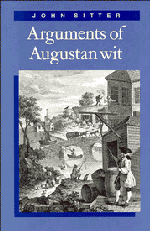Book contents
2 - About wit: Locke, Jakobson, and Augustan ideas
Published online by Cambridge University Press: 28 January 2010
Summary
For thee explain a thing till all men doubt it,
And write about it, Goddess, and about it …
Dunciad, IV. 251–52Sooner or later in any discussion of Augustan literature the word Wit, if not the spaniel, splashes its way back to the hunter's side. That major authors of the Restoration and early eighteenth century prized and practiced wit is perhaps the one thing every succeeding generation has agreed on, although with widely differing evaluations of that achievement. Each retrospective estimate of Dryden or Pope seems, interestingly, to approach Dryden's view of one of his predecessors: “if we are not so great wits as Donne, yet certainly we are better poets.” As Dryden's usage and the work of many modern scholars remind us, the value and definition of wit have been complex all along. Wit is Nature in ambiguity dressed – and so is Nature.
Despite the broad problems of historical semantics, readers continue to agree that Restoration repartee, The Rape of the Lock, Fielding's asides and prefaces, most of the poetry of Swift and Prior, and The Beggar's Opera are all witty. Whatever we take Augustan wit to be, we are likelier to seek it in Gay than Gray. We do not seek it everywhere in the period – rarely in Defoe, scarcely in Richardson, for example – but wherever we find it the impression is generally one of hearing a shared language of the age rather than a clever idiolect.
- Type
- Chapter
- Information
- Arguments of Augustan Wit , pp. 49 - 88Publisher: Cambridge University PressPrint publication year: 1991



